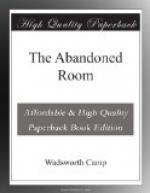She walked across the hall and disappeared in the newer corridor. Without witness he faced the old corridor, and with the attempt directly ahead his repugnance achieved a new power. The black entrance with its scarcely dared memories reminded him that what he was about to do was directed against more than human law, was an outrage against the dead man. He had to remind himself of the steely purpose with which Howells had marked him as the murderer; and the man’s power persisted after death. In such a contest he was justified.
He took the candle from the table. Through the stair-well the murmur of Graham’s voice, occasionally interrupted by Groom’s heavy tones or the languid accents of Paredes, drifted encouragingly. Trying to crush his premonitions, Bobby entered the corridor. Instead of illuminating the narrow passage the candle seemed half smothered by its blackness. For the first time in his memory Bobby faced the entrance of the sinister room alone. He pushed open the broken door. He paused on the threshold. It impressed him as not unnatural that he should experience such misgivings. They sprang not alone from the fact that within twenty-four hours two men had died unaccountably within these faded walls. Nor did the evidence pointing to his own unconscious guilt wholly account for them. At the bottom of everything was the fact that from his earliest childhood he had looked upon the room as consecrated to death; had consequently feared it; had, he recalled, always hurried past the disused corridor leading in its direction.
Through its wide spaces the light of the candle scarcely penetrated. No more than an indefinite radiance thrust back the obscurity and outlined the bed. He could barely see the stark, black form outstretched there.
The dim, vast room, as he advanced, imposed upon him a sense of isolation. Katherine in the upper hall, the others downstairs, whose voices no longer reached him, seemed all at once far away. He stood in a place lonelier and more remote than the piece of woods where he had momentarily opened his eyes last night; and, instead of the straining trees and the figure in the black mask which he had called his conscience, he had for motion and companionship only the swaying of the curtains in the breeze from the open window and the dark, prostrate thing whose face as he went closer was like a white mask—a mask with a fixed and malevolent sneer.
The wind caught the flame of the candle, making it flicker. Tenuous shadows commenced to dance across the walls. He paused with a tightening throat, for the form on the bed seemed moving, too, with sly and scarcely perceptible gestures. Then he understood. It was the effect of the shaking candle, and he forced himself to go on, but a sense of a multiple companionship accompanied him—a sense of a shapeless, soundless companionship that projected an idea of a steady regard. There swept through his mind a procession of figures in quaint dress and with faces not unlike his own, remembered from portraits and family legends, men and women to whom this room had been familiar, within whose limits they had suffered, cried out a too-powerful agony, and died. It seemed to him that he waited for voices to guide him, to urge him on as Katherine had urged him, or to drive him back, because he was an intruder in a company whose habit was strange and terrifying.




